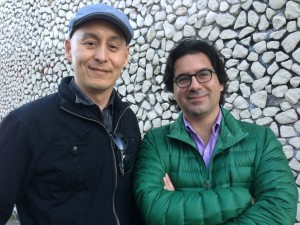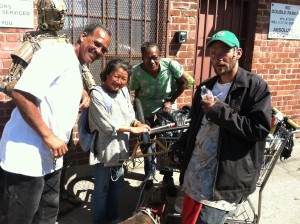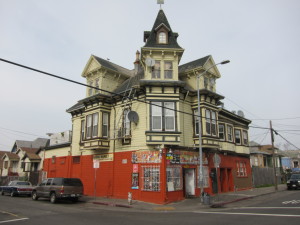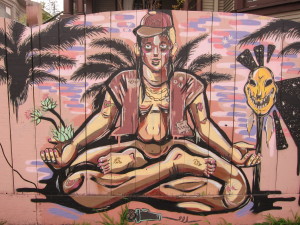
By Sharon Simonson
The mean streets of West Oakland seem an odd place to uncover kinship and hope.
But that’s what Iranian-American filmmaker Amir Soltani found as he made his 95-minute documentary, “Dogtown Redemption,” about the homeless recyclers who make their lives there.
Though his family came to America when he was 16 years old, pushed from their homeland by the 1979 Iranian Revolution, and he attended high school in Boston and later Harvard University in Cambridge on a scholarship, it wasn’t until he moved to Oakland eight years ago that he felt true community in the U.S.
What he discovered in West Oakland were people, who — like immigrants and refugees — had lost their connections to family and friends and their lifelines to better lives.![]() As he learned the daily rituals of the shopping-cart recyclers and the nuances of their craft, he unearthed unexpected kinship, economic insight and self-discovery. He was struck by the vast contradictions between the kindness he had experienced in America with the social callousness toward the poor and homeless.
As he learned the daily rituals of the shopping-cart recyclers and the nuances of their craft, he unearthed unexpected kinship, economic insight and self-discovery. He was struck by the vast contradictions between the kindness he had experienced in America with the social callousness toward the poor and homeless.
“I will never forget the first friends I made in America and how warm they were. As an immigrant, you receive so much and you appreciate it all — the connections and the friendships,” he said. “When people don’t have those, and they can’t create them because of mental health issues or stereotypes, they are in trouble.”

“The immigrant community appreciates all of those things that connect us because we know what it is like to be an outsider,” Soltani said.
He lived with his brother, executive director of the American Civil Liberties Union of Northern California, in his brother’s West Oakland condominium. It was from the comfort and refuge of that home that he first heard the rattling of the homeless’ shopping carts as they passed outside his door, stopping to pick through the garbage for the plastic bottles and metal cans put out for collection.
Michael Krasny, host of “Forum” on KQED 88.5 FM public radio, described the film as “poignant” and “moving” during 49-year-old Soltani’s April 5 guest appearance: “This film you have done really had quite an effect on me,” Krasny said.
The documentary had its world premiere in the fall at the Mill Valley Film Festival in San Rafael. This week four screenings are scheduled in San Francisco and the East Bay, including tonight, April 7 at 7 p.m. at the Christopher B. Smith Rafael Film Center in San Rafael and at 3 p.m. Saturday, April 9, and 1 p.m. Sunday, April 10, at The New Parkway Theater in Oakland. It has its national television premier May 16 on PBS’ “Independent Lens,” which airs independent documentary films weekly.
“You’d hear people go through the trash when you put it out,” Soltani told Krasny of his life in West Oakland, “and it wasn’t just one. It was one, two, three, four.”


“You realized they were in competition with each other,” Krasny said.
“Every day I got it all worked out what I’m going to do, where I’m going to go, and and who I am going to avoid,” recycler Jason Witt explains in the film. “There are other recyclers who try to figure out my routes. I got to keep my routes secret because there’s a whole lot of other recyclers trying to do the same thing.”![]()
Despite the recyclers’ suffering and harsh circumstances, their resilience inspired him, Soltani said: “They have lost every possible form of insulation, and by the grace of the universe they have defied Darwin.” At least so far. Alliance Metals, the economic center of the recyclers’ West Oakland community, is slated to close in August.